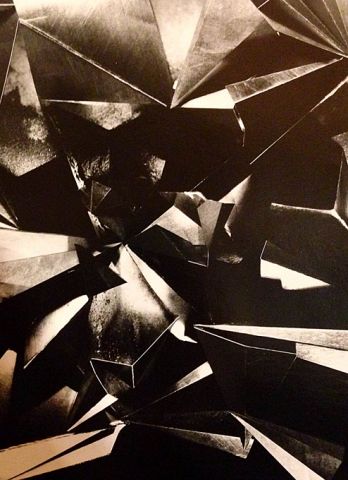Meeting / Reaction / Result
<CP>
For me, photography and how I have employed it, had developed into something frustratingly intangible – where the contents of the image remained untouchable within encoded bits of information, locked inside a computer screen. But I found with your work – the composition, tone and the physical experience of the print are the most rewarding part of your work. I can use photography as an artist, but I’m not a photographer, I lack your love of smelly chemicals, wet hands and fiddling around in the dark, my previous experiences in the darkroom have been both frustrating and embarrassing. For many years I worked with a camera but recently I’ve moved away from it – my work became too pixellated, too distant from the physical, too digital. I have returned to drawing as a means of reconnecting with the physical process of making work, the tactility of the drawn surface and the real experience of making marks.
Despite the many positive aspects of your practice I still have concerns about how we can move forward into collaboration, based on my experiences of knowing you and your pointed critiques of my work. Your frames of reference are very distant to mine, you like work that I hate and you can’t see why I dislike it, you don’t listen and you always think you know best. I suspect that you will moan that the work we make has no subject and isn’t ‘about’ anything, that it’s bourgeois and pretentious and lacks humanity, and that looking at my work is like staring into a void.
<EO>
Firstly. what I respect about your work is your use of line, and the intensity of the monochrome, graphite work. I am not sure where to go with it and how I can relate to it, but maybe that’s what excites me? Now, what do I see in your work that reflects my ideals? I like the paper, I like the lines. What excites me about our project? Working with the materials that I know and talking to you about where we can meet in the middle of a chasm of visual vernaculars. I relate to your exploration of process, of the analogue, and where you constantly ask questions through your work without necessarily expecting answers.
I’m very concerned about the lack of subject. I’m worried that half way through the project (or sooner) I’ll start screaming about the lack of humanity. Humanity is important to me and it shows in my work – it’s all about the people in my images and how they connect to a wider audience. How does your work relate to anyone? Can I see anything in this abstract shit? What will my peers think when I take my prints off the drying rack at Photofusion and they see nothing there? My work is for people and about people. But I’m willing to ask, ‘does my photography define me? Should it?’ This is the one chance to ask questions about photography that only an artist would ask and vice versa, to ask questions about art that only a photographer would ask. Photographers and artists are two different things. In most instances an artist doesn’t have to get paid to do what they do, they can get paid but for many people being an artist isn’t just about that. In my mind, and through how I learned to be a photographer, we are commercial artists. My position as a photographer is about capitalism, making work that makes money is everything. That doesn’t take priority over the quality or intention of the work, but the motivation to make the work has to consider its value in a capitalist economy. You can be an artist that uses a camera, but that doesn’t make you a photographer.


